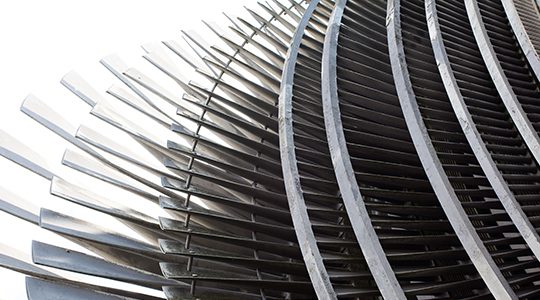NEWS & EVENTS
Less breaking, more making first goal of LIFT titanium project

GE Aviation and The Ohio State University lead the LIFT partnership focused on advanced computer analytics.
Detroit, January 18, 2015. The third technology project announced by LIFT (Lightweight Innovations for Tomorrow) will focus on titanium – a lightweight metal that has potential for more uses in aircraft engines and other aerospace designs if new technologies can reduce the cost of designing and testing new parts. Lead partners on the project, GE Aviation and The Ohio State University will focus first on advancing computer analytics to better understand and predict the performance of titanium alloys.
“Titanium is expensive, and engineers have to ‘make and break’ a lot of test parts before they can be sure the design is right for a critical component of an airplane engine,” said Alan Taub, chief technology officer at LIFT. “If we can advance the abilities of our computer models to better predict how a particular design will perform, we can test less. That cuts material and testing costs and the lead time for developing new designs.”
Lawrence E. Brown, executive director of LIFT, said, “The cost of titanium itself and the time it takes to design and test new components are significant barriers. If this partnership between industry and academia can lower that barrier, it will encourage more use of this very versatile lightweight metal. Turbine fans in aircraft engines, for example, operate in demanding conditions, but are critical to maintaining high performance.”
Thomas F. Broderick, senior staff engineer, structural materials development, GE Aviation said, “Our interests emphasize development of computational means to predict fatigue and ballistic impact resistance within the highly transformed microstructures that are formed about the solid state weld interface.”
Boeing and Scientific Forming Technologies Corporation are the other industry partners on the project. EWI, Purdue University, Southwest Research Institute, University of Michigan, and the University of North Texas will contribute to the project as research participants.
This project is different from the two earlier projects in its focus on integrated computational materials engineering that could apply across several related manufacturing processes. “This project aims to develop computer models that will reduce by 50% both the time and cost for materials development, component design, and manufacture,” said Taub. “In addition, the new computational tools will help us manufacture components that perform better.
About LIFT
LIFT is operated by the American Lightweight Materials Manufacturing Innovation Institute (ALMMII) and was selected through a competitive process led by the U.S. Department of Defense under the Lightweight and Modern Metals Manufacturing Innovation (LM3I) solicitation issued by the U.S. Navy’s Office of Naval Research.
LIFT is one of the founding institutes in the National Network for Manufacturing Innovation, a federal initiative to create regional hubs to accelerate the development and adoption of cutting-edge manufacturing technologies. Visit www.lift.technology to learn more.